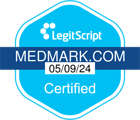Methadone is an FDA-approved medication that is used to treat people who are struggling with opioid addiction. Methadone is a full opioid agonist, which means it reduces opioid cravings and withdrawal symptoms and prevents the effects of opioids.
Buprenorphine and buprenorphine with naloxone, commonly known as Suboxone, are FDA-approved medications that are used to treat people with opioid use disorder. Buprenorphine is a partial opioid agonist, which means it diminishes opioid withdrawal symptoms and cravings and lowers the potential for misuse.
Medication assisted treatment (MAT) is an approach for treating opioid use that uses medication to reduce opioid cravings and withdrawal symptoms. When combined with counseling and support, MAT is the most effective solution for opioid addiction treatment.
Buprenorphine and methadone could potentially interact with other medications, so you should always speak with your provider and counselor about any medications you are currently taking so we can help manage them in a safe and effective way.
During treatment, it is important to figure out why you started and continued to use opioids. Our counseling can help you change your thoughts and behaviors and learn new ways to cope with stressors. You will also discover how addiction works and how to maintain recovery.
Once we have addressed your cravings and withdrawal symptoms with medication, we can help you improve your physical, mental and emotional health by focusing on eating a nutritious diet, drinking plenty of water, getting regular exercise and developing a sleep schedule.
Our programs offer guest medication services so you can receive your dose at any MedMark-affiliated location nationwide. You do not need to be our patient to use guest medication services, but there is a daily fee to receive your medication at another location.
Learn More
We accept cash, credit cards, debit cards and money orders, but we do not accept personal checks. Most treatment centers also accept Medicare, state Medicaid plans, many commercial insurances, and VA coverage. Specific centers may offer grant funding to assist with payment based on eligibility criteria. Call your nearest clinic for more information.



